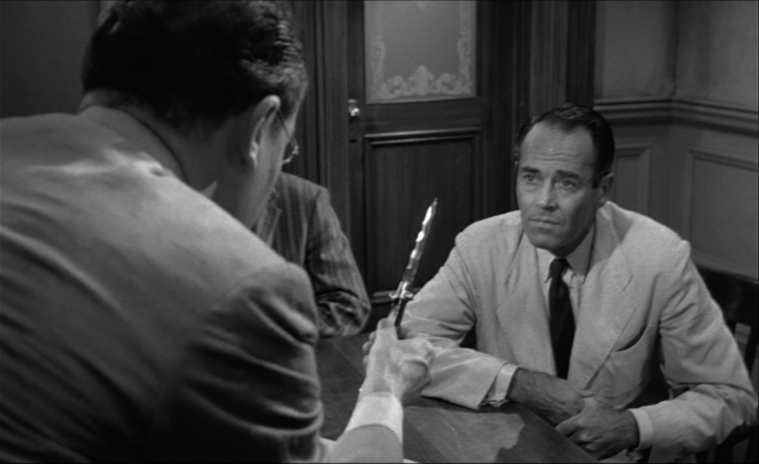
Between the crime and the punishment comes the judgment. In Ancient Egyptian mythology, Anubis weighed the heart of the deceased against a feather. Ancient China maintained an underworld bureaucracy overseen by the Ten Magistrates of Hell. In Christian theology, the quick and the dead assemble before the throne of God and have their actions laid bare. A mechanism exists, at the metaphysical level, for determining guilt and allotting appropriate punishment.
Such an objective measure is difficult to come by in the quotidian world of the flesh, and so it falls to humans to make the call regarding guilt and innocence. And these humans are, at best, flawed. 12 Angry Men is, among other things, a meditation on the difficulty of assigning punishment in a world where guilt and innocence are not so easily determined, where personal neuroses get in the way of objective judgment. Called upon to determine the guilt of innocence of a young man–hardly more thana boy–each of the jurors, including the heroic Juror #8 (Henry Fonda), is caught in his own psychological web. Juror #12 (Robert Webber) is an other-directed man who needs to please everyone; Juror #4 (E.G. Marshall) is obsessed with order at the expense of humanity; Juror #2 (John Fiedler) is constitutionally timid; and so on. Hanging over all of them–it’s in the title–is the specter of midcentury
masculinity, most clearly typified in the recalcitrant Juror #3 (Lee J. Cobb), whose emphasis on a particular kind of butch manliness has alienated his son and now drives him to punish the young man accused of murder.
That there has been a crime is certain. That there must be a punishment is–to these men, anyway–equally sure. Getting there is the problem. And, absent any dog-headed deities or audiences before the Throne of Judgment, the way forward is the difficult, slow, and painful process of coming to terms with both the facts of the case and–what is more terrifying–the fact of the self. The ultimate punishment meted out in this film is not on the accused boy; it is on the men who insist on living inside their own self-imposed prisons and inflicting their self-assigned punishment on other people. The anger of these men is the anger of a caged beast, and only a terrific confrontation with their own guilt can set any of them free. — N. Booth (2024)
Arts & Faith Lists:
2024 Top 25 Crime and Punishment Films — #2